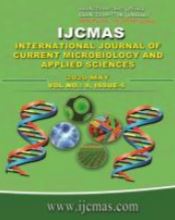


 National Academy of Agricultural Sciences (NAAS)
National Academy of Agricultural Sciences (NAAS)

|
PRINT ISSN : 2319-7692
Online ISSN : 2319-7706 Issues : 12 per year Publisher : Excellent Publishers Email : editorijcmas@gmail.com / submit@ijcmas.com Editor-in-chief: Dr.M.Prakash Index Copernicus ICV 2018: 95.39 NAAS RATING 2020: 5.38 |
Integrated Nutrient Management approach to the management of plant nutrients for maintaining and enhancing soil, Soil fertility maintenance requires a balanced application of inorganic and organic nutrient sources. Sustainable agricultural productivity might be achieved through wise use of integrated nutrient management. Integrated use of the organic and inorganic source of plant nutrients on growth and yield attributes is very crucial for the assurance of food security. The integrated plant nutrient supply/management is an important approach for maintenance or adjustment of soil fertility and plant nutrient supply to an optimum level for sustainable crop productivity through optimization of benefit from all possible sources of plant nutrients in an integrated manner which includes; Maintain or enhance soil productivity through a balanced use of fertilizers combined with organic and biological sources of plant nutrients and also to reduce inorganic (fertilizer) input cost. Organic sources such as FYM, bio compost, vermicompost, NADEP compost, green manures, crop residues and industrial wastes have been used in various cropping systems. Soil as a source of nutrients must be protected from all kinds of external factors, especially from the addition of fertilizers in excessive rates. Any degradation in the quality of soil can significantly produce many undesirable changes in the environment and also reduces the overall crop yield. The amount and availability of nutrients in organic materials vary widely, which interprets the value of nutrients supplied.
 |
 |
 |
 |
 |